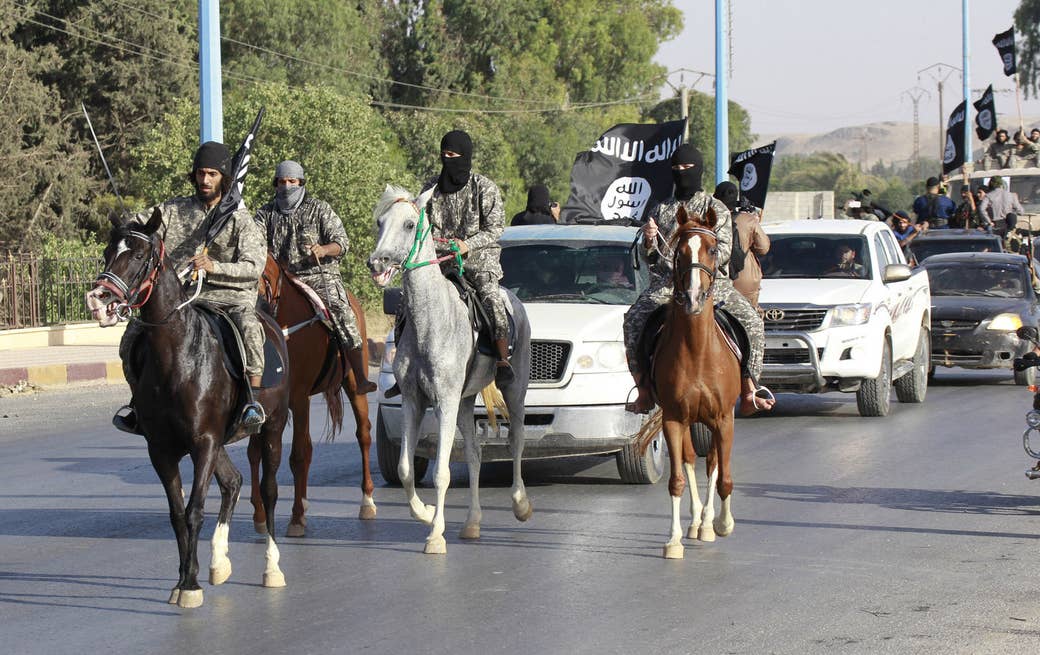
CAIRO — The first thing ISIS does when it seizes control of a town is find a high-profile crossroads in the center and set up a saha al-hudood — the square of transgression, or punishment.
It is there ISIS beheads those it says are infidels, pummels to death adulterers and gay people, and cuts off the limbs of those accused of theft, after which it announces the punishments by posting graphic images on message boards and Twitter.
The terror generated by the square is the group's ultimate source of power, and understanding that is essential to understanding how ISIS operates and recruits, and, therefore, how to defeat it, say Syrian fighters who have confronted the group on the ground daily since January 2014, as well as those closely following the group.
“They bring in the people who they claim left Islam and behead them,” said Mahmoud Sharif, a fighter with Battalion 13, a unit of the Free Syrian Army (FSA) in northern Syria that fights daily against both ISIS and the regime of Syrian President Bashar al-Assad. “Killing is normal for them. They don’t allow anyone to raise their head and speak, but behead them immediately. Any movement, call for change, is not acceptable. They don’t care about humanity; it is their last care.”
From Mosul in Iraq to the Sinai Peninsula in Egypt to the coastal towns of Libya, ISIS has been expanding its presence in much the same way. It seizes control of small territories and expands with violence and cruelty so extreme as to give itself an aura of invincibility. Locals in its path must choose between joining ISIS’s project or suffer at its hands. That’s how it managed to beat an overwhelming number of Iraqi forces in Mosul last year, how it outmaneuvered other jihadi groups in the Libyan cities of Derna and Sirte, and how it is inserting itself into troubled lands from south Asia to the Arabian Peninsula to Africa.
“One of ISIS’s successes is to not only to conquer territory but to defeat souls, to psychologically defeat its enemy,” said Ahmed Ali, an Iraqi security and counterinsurgency specialist now teaching at the American University of Iraq in the city of Suleymaniyah.
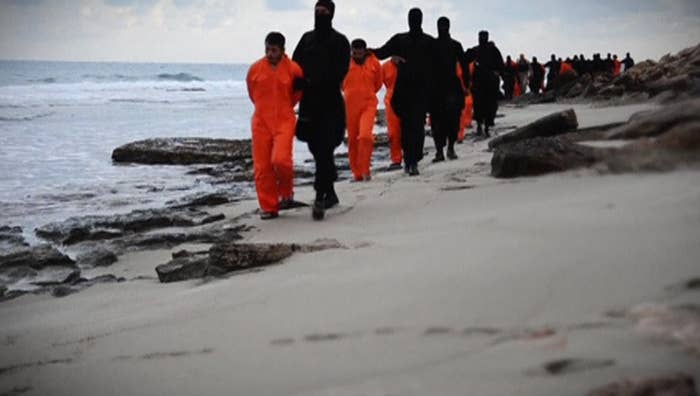
ISIS's slick propaganda videos show beheadings and immolations, borrowing motifs from horror movies to inspire revulsion and fear. Its claim of credit for last week’s coordinated terror strike in Paris, which involved seizing a concert hall and gunning down civilians as retribution for French airstrikes in Syria, and for the downing of a passenger plane filled with Russian civilians, are an extension of the square of punishment beyond the group’s original borders, as well as an expression of its grand ambitions, say terrorism experts and those who have fought ISIS on the ground since it emerged from the wreckage of Syria and Iraq.
“They want to change the way of viewing the world,” said Anne Giudicelli, managing director of the Paris consultancy Terrorisc, which researches extremist groups in the Middle East. “They want to shake up the power balance order to create a real alternative.”
The US and its allies, including France, have expanded a campaign of airstrikes targeting ISIS assets such as its energy resources and training bases. But those on the ground fighting the group say that checkmating ISIS militarily and choking off its financial resources is just part of the fight — puncturing its aura, the shroud of terror and omnipotence it wraps around itself, will be a major step to defeating the group.
“They do everything to make the other side feel afraid and then to shock them and defeat them,” said Idriss Nassan, an official in the Kurdish-run Syrian city of Kobane, which has been fighting ferociously against ISIS for more than a year. “When you believe in your own power and your own community, you can give people hope and organize them against the terrorists.”
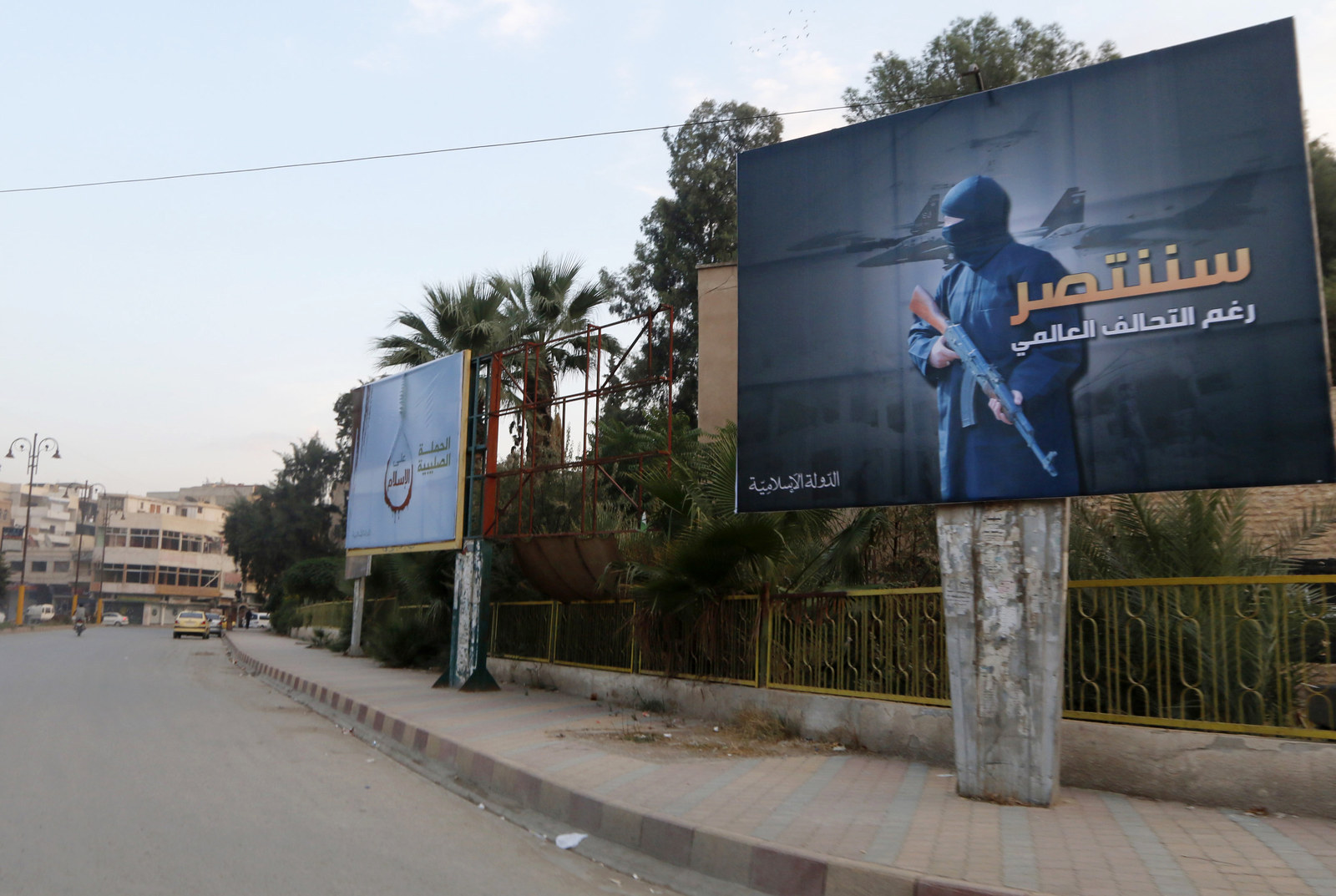
Despair is Sheikh Ibrahim al-Maniey’s biggest enemy as he struggles to keep the young men of his Mahdia tribe, based in Egypt’s northern Sinai peninsula, from joining ISIS’s local affiliate. The Sinai Province group, a branch of ISIS, has taken root and expanded since the government of former Egyptian president Mohamed Morsi was toppled in 2013. It launched a campaign of assassinations and bombings against security and government officials, despite Egypt's efforts to fight it with a campaign of airstrikes, home demolitions, and mass arrests in northwest Sinai. Rights advocates say at least 11,000 people have been arrested and detained in Egyptian prisons on terrorism accusations in 2015 alone.
“The government is pushing thousands of youth to say they are joining the Islamic State,” said an angry Maniey, speaking by telephone from the adjacent Gaza Strip. “I keep telling them, 'This is a terrorist group. This is far from Islam. This will bring disaster upon you and the tribe.' But they say, ‘Give me one alternative.’”
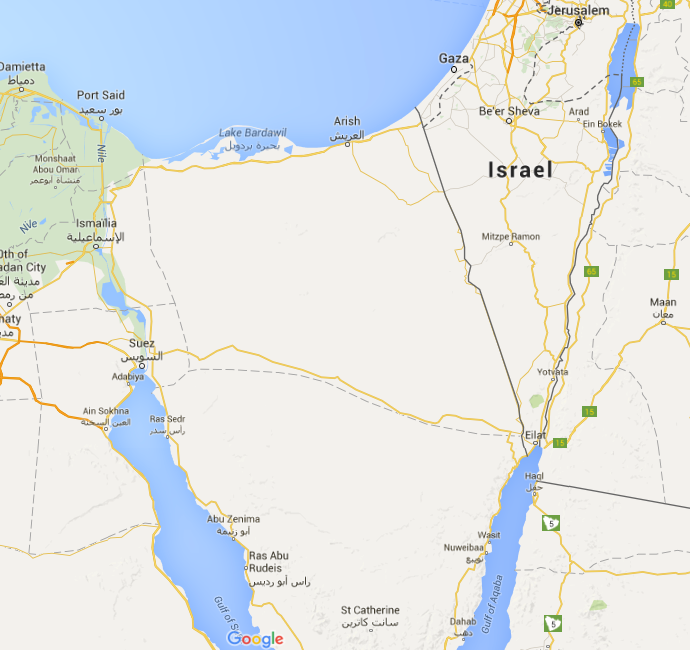
In attempting to strangle ISIS, Egyptian forces have cleared 25 miles of territory along the border with Gaza, forcing thousands of families from their homes, often after giving them mere days of notice in what appears the very opposite of the “hearts and minds” campaign advocated by counterinsurgency specialists.
They have strafed villages with fighter jets and Apache helicopters and rousted people from their homes in aggressive house-to-house raids involving thousands of troops and Abrams tanks. Most analysts estimate ISIS’s Sinai branch has no more than 2,000 fighters. But according to Egyptian authorities, at least 415 Sinai militants were killed in one 10-day operation earlier this year.
And the attacks have continued, growing in scale and sophistication, from ambushes on Egyptian army checkpoints to multipronged attacks on numerous armed forces bases, to the patient and calculated infiltration of an airport required to smuggle a homemade bomb in a Schweppes can aboard a plane, as claimed in Dabiq, the ISIS magazine, a day after Moscow confirmed a bomb downed the plane. What’s more, ISIS has expanded to the county’s Western desert, along the Libyan border, despite a campaign of airstrikes including a mistaken attack last summer on a group of picnicking Mexican tourists that left a dozen people dead.
“They were a very small armed group two years ago, killing maybe two or three soldiers in an attack,” says Sherif Moheyeldeen, a counterterrorism specialist at the Egyptian Initiative for Personal Rights, a Cairo advocacy group. “But they have developed their capabilities. They are smart guys. They choose their battles. They know what to do and when to do it.”
ISIS has proven relatively impervious to heavy-handed military and security tactics, whether by the forces of Gen. Khalifa Haftar in Libya, President Abdel-Fattah el-Sisi in Egypt, or by the U.S.-led coalition in Iraq and Syria. In fact, there is some evidence to suggest that such warfare helps it grow, preventing civilians from leaving the orbit of an armed group that presents itself as both punisher and protector.
“People are comparing the way ISIS is treating them and the way the Egyptian army is treating them,” said Maniey. “If they do the math, they will end up with ISIS.”
Terror is the tool ISIS uses to intimidate and subdue enemies. But it is also how it controls its followers and fighters.
Faced with overwhelming force, ISIS melts into the desert in Egypt and other battlefields. In the rare instances when it has suffered a decisive battlefield defeat, winning over local populations, soothing their fears, and giving them a stake in the outcome of the battle has proved crucial, as was the case in the battle for Kobane. “They use every terrorist tactic, sending suicide cars, suicide trucks, suicide bombers,” said Nassan, the Kurdish militia leader, whose forces defeated ISIS in northern Syria. “We know them and we don’t fear them, because we believe in ourselves and our project. When you provide your people with peace and protection, they join you and believe in you and you can defeat your enemies.”
Defenders of Egypt’s war strategy say the number of attacks by militant groups has decreased, largely because the security forces have managed to crush several non-ISIS groups in the country’s mainland. But the growing sophistication of the attacks may only mean that ISIS is choosing its targets more carefully, and there is little evidence that the security forces have done anything to stem the tide of new recruits.
Even some close to the security establishment question the way Egypt is pursuing the fight. One security adviser to charities in Egypt, speaking on condition she not be identified, lamented that the government has done close to nothing to compensate those whose houses it has bulldozed as part of security operations, creating thousands of potential new recruits. Meanwhile, young men and women are being regularly recruited via Facebook.
“The war in the Sinai is going badly, of course,” said retired Egyptian army Maj. Gen. Adel Suleiman, who once oversaw troops in the rugged, arid peninsula. “The Egyptian army is using a strategy that is not very good. It is only a military strategy, but it needs some other efforts — to reach out to the Sinai people, to protect the civilians, and recruit them to your side.”
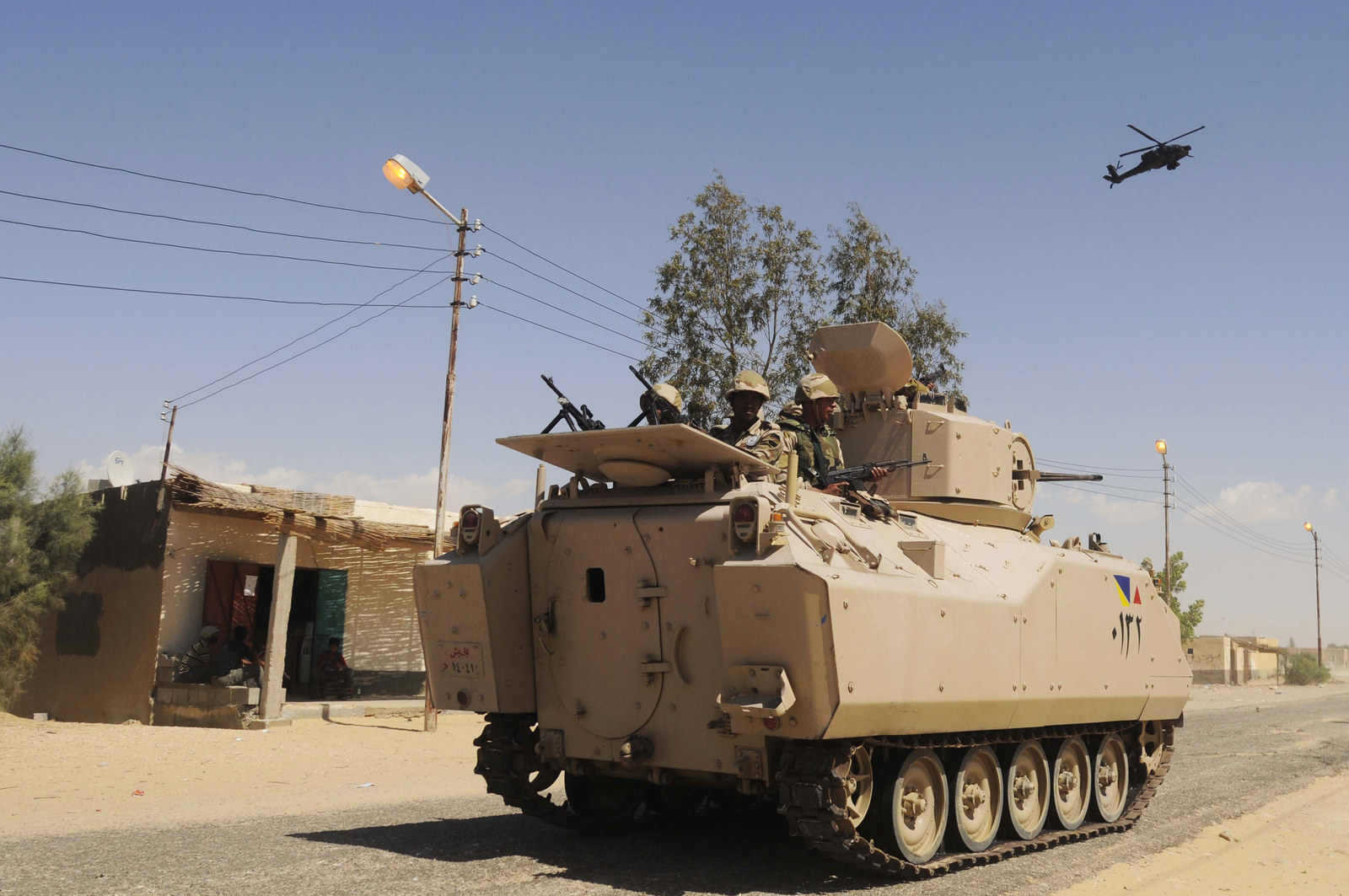
In the latest 66-page issue of the English-language version of Dabiq, ISIS published an article, titled “Advice to the Mujahedin: Listen and Obey,” warning its foot soldiers to follow orders without question. “How many times has a leader been disobeyed in some of the lands and arenas of jihad, and the price paid as a result was calamity and tribulation?” the article asks. “Disobeying the leader is not merely a sin that affects the sinner alone. Rather, it affects the entire group, and most of the time, the entire army.”
Terror is the tool ISIS uses to intimidate and subdue enemies outside its orbit. But it is also how it controls followers and fighters, guarding carefully against any of its men defecting or fleeing abroad. “There are fighters trying to leave ISIS,” said Sharif, the Syrian rebel fighter. “But they’re monitoring too closely and they won’t let them leave. When the fighters find ISIS’s true face, they try to leave but they don’t let them. They kill them instead.”
But ISIS’s psychological tactics may also be turned against it. As the U.S. and its allies cast about for ideas to confront ISIS, those fighting them say it’s not enough to bomb them and list tallies of the dead in dry press releases — the grim footage of their deaths must be broadcast, said Ali, the Suleymaniyah-based researcher.
“Use fear to degrade ISIS and defeat it,” he said. “ISIS does everything by the sword. One of the ways to defeat it is to use overwhelming power and to show people who might be inspired by ISIS that you can also apply the same level of fear and intimidation.”
Just as ISIS broadcasts videos of its victims being beheaded, the gory footage posted online by Shia militias and Kurdish fighters may serve a tactical function, dispelling ISIS’s mystique and send a message to those considering joining the group they may well die the same horrific death they fantasize they they will inflict on others, said Ali.
“All these videos add up to the picture of ISIS as an organization that can be defeated brutally,” he said. “The anti-ISIS coalition doesn’t get that. At the end of the day, the saha al-hudood does resonate with ISIS supporters. There has to be an effort to conquer that message. It has to start from the battlefield.”
